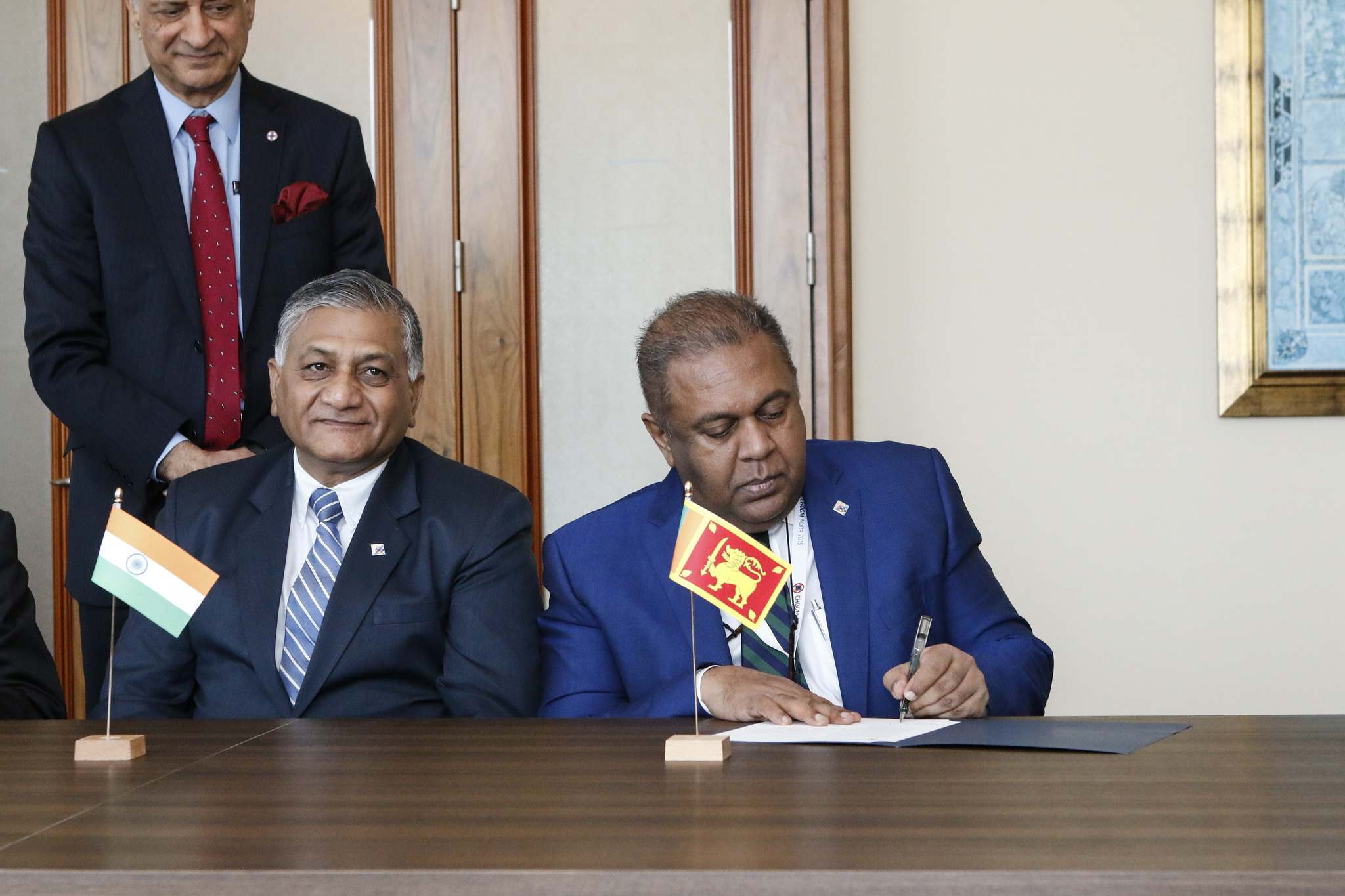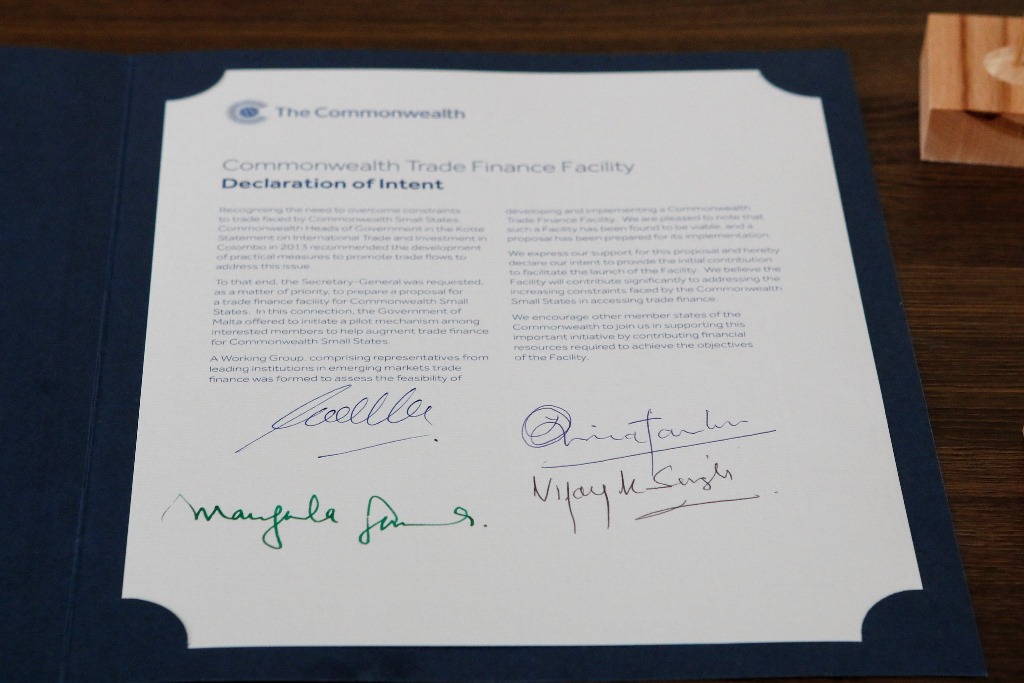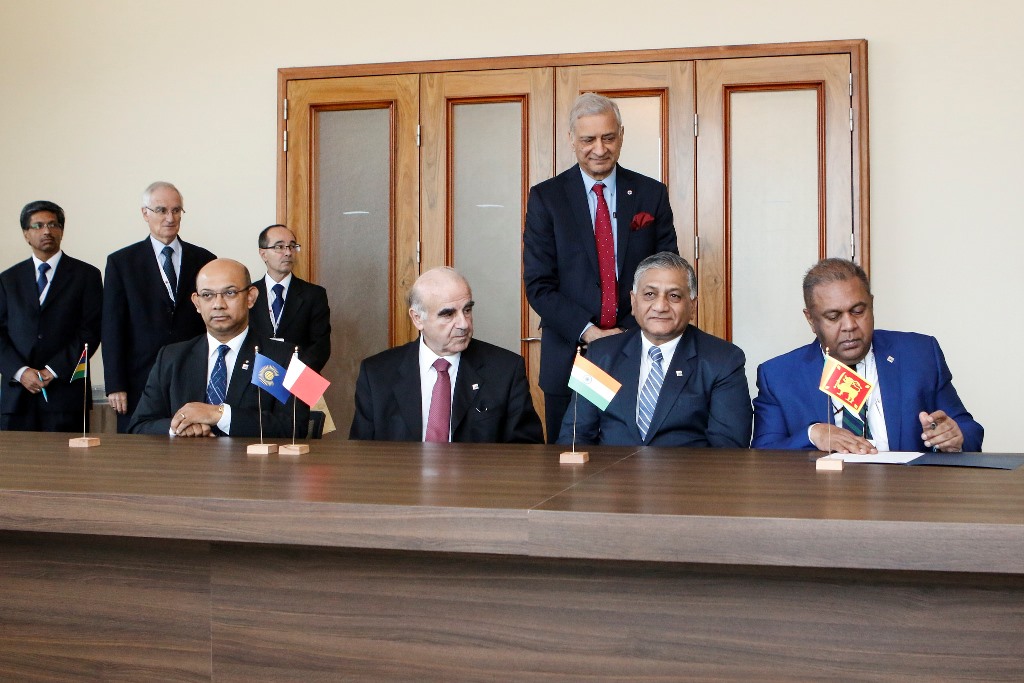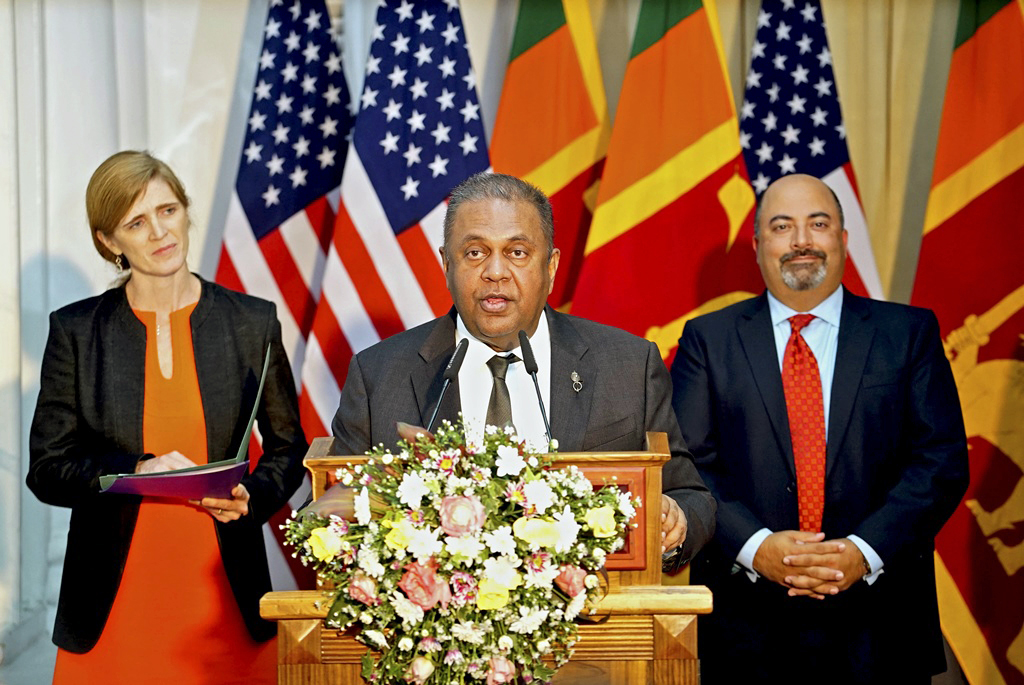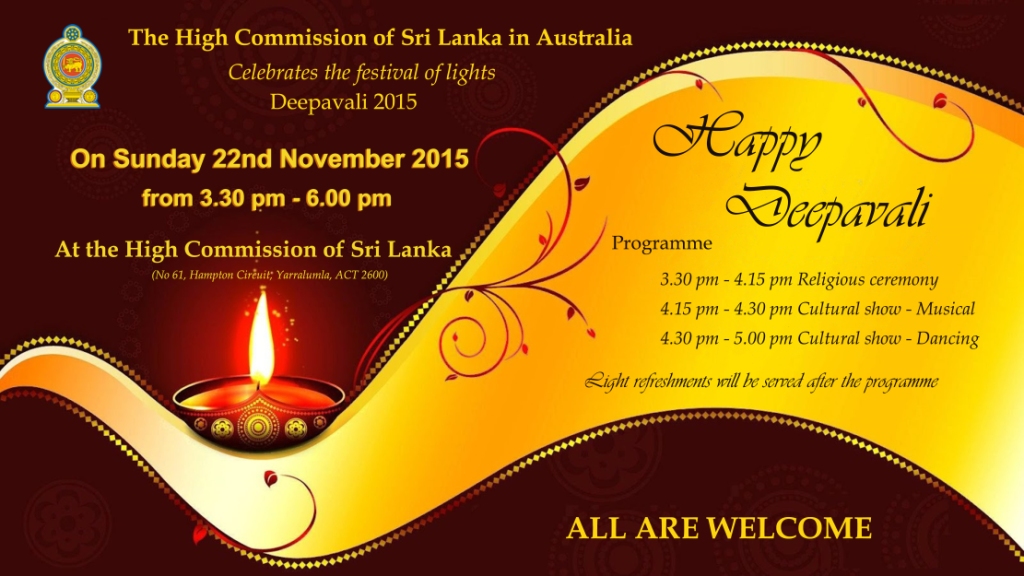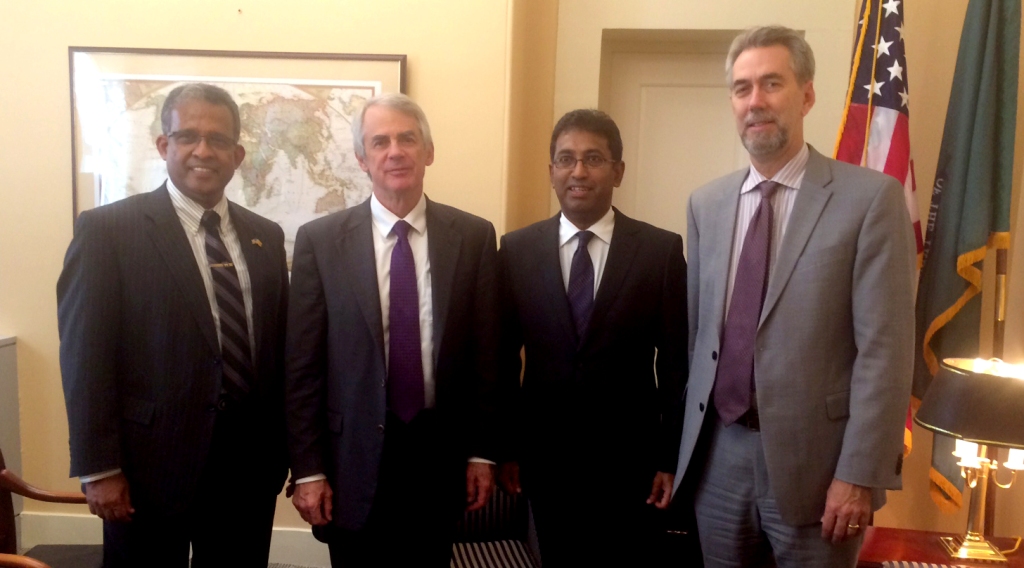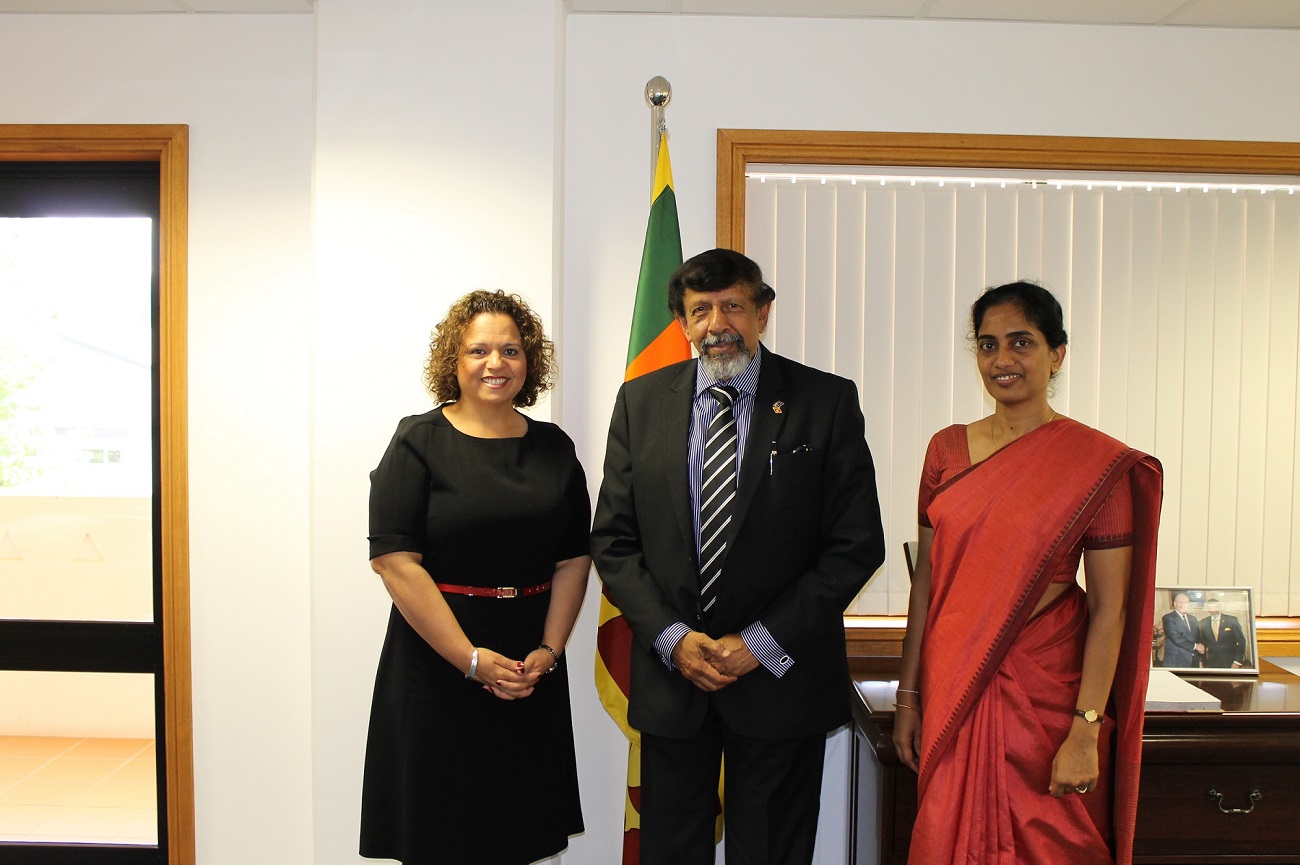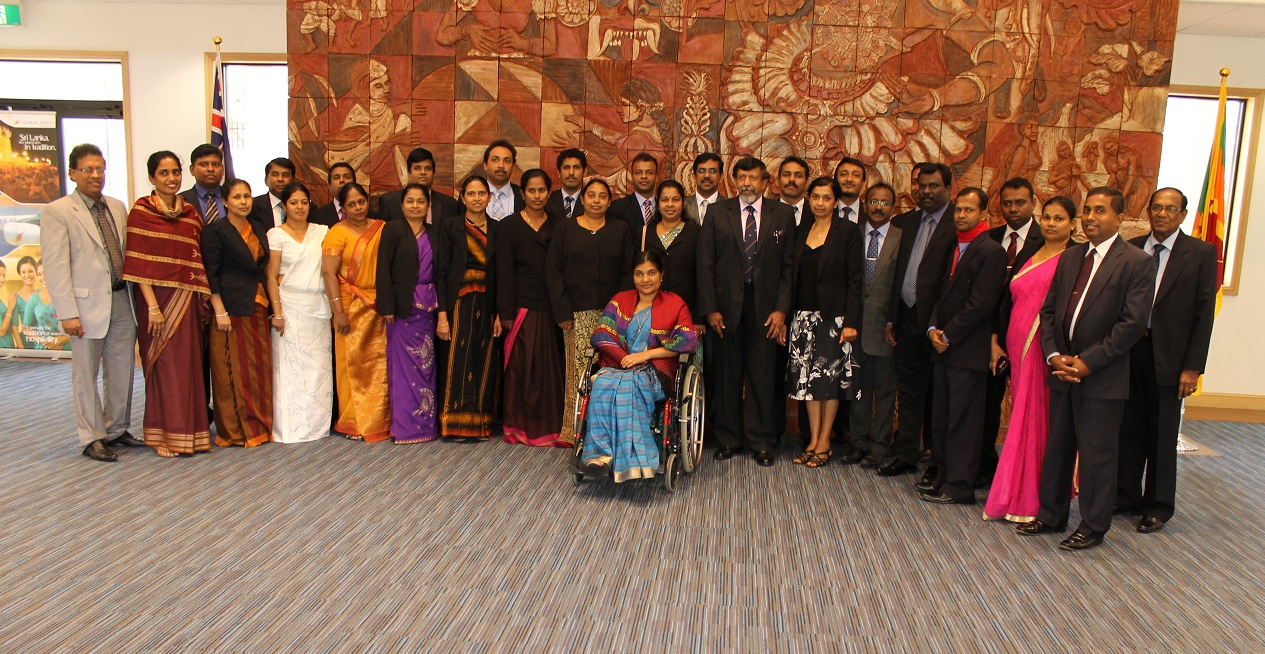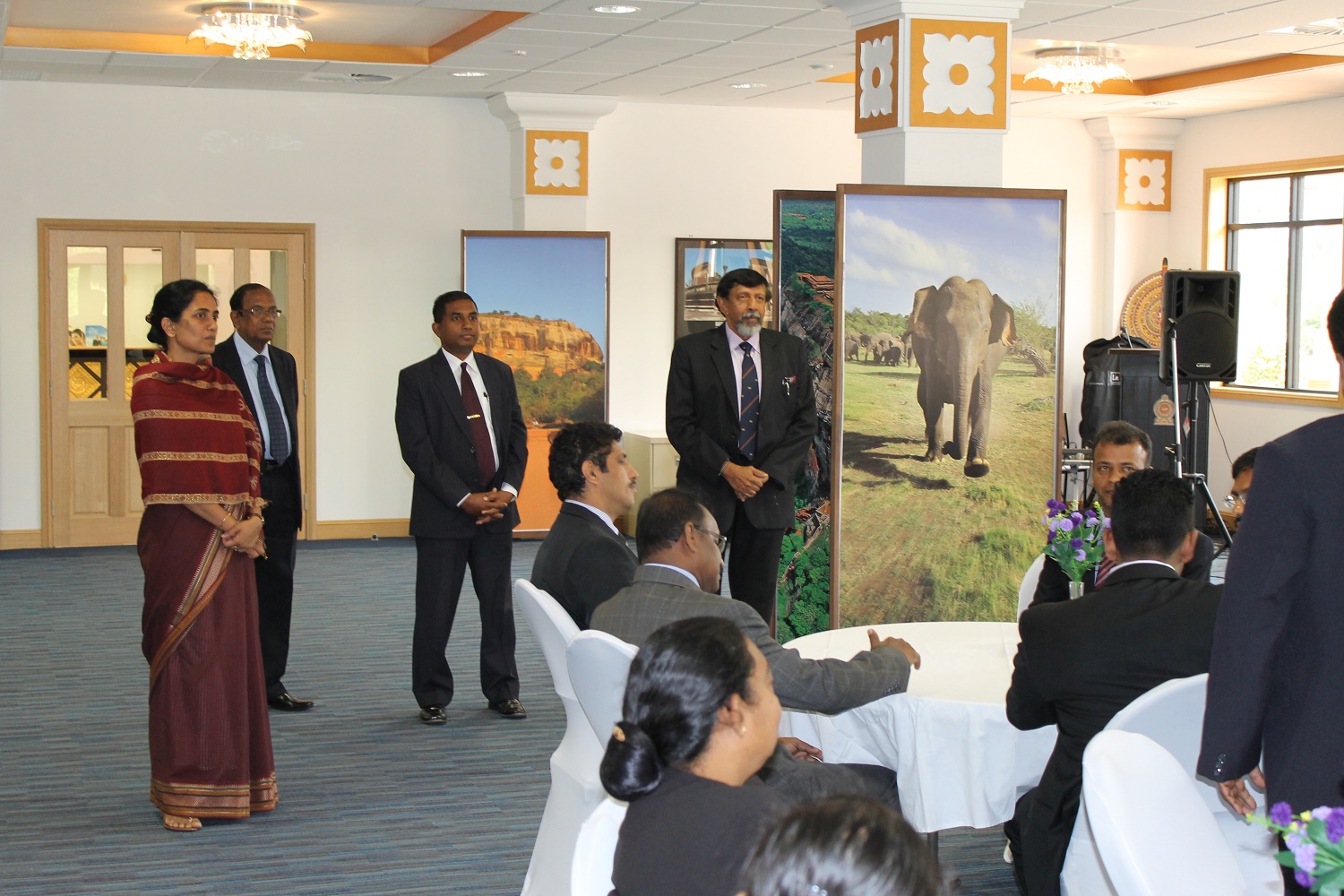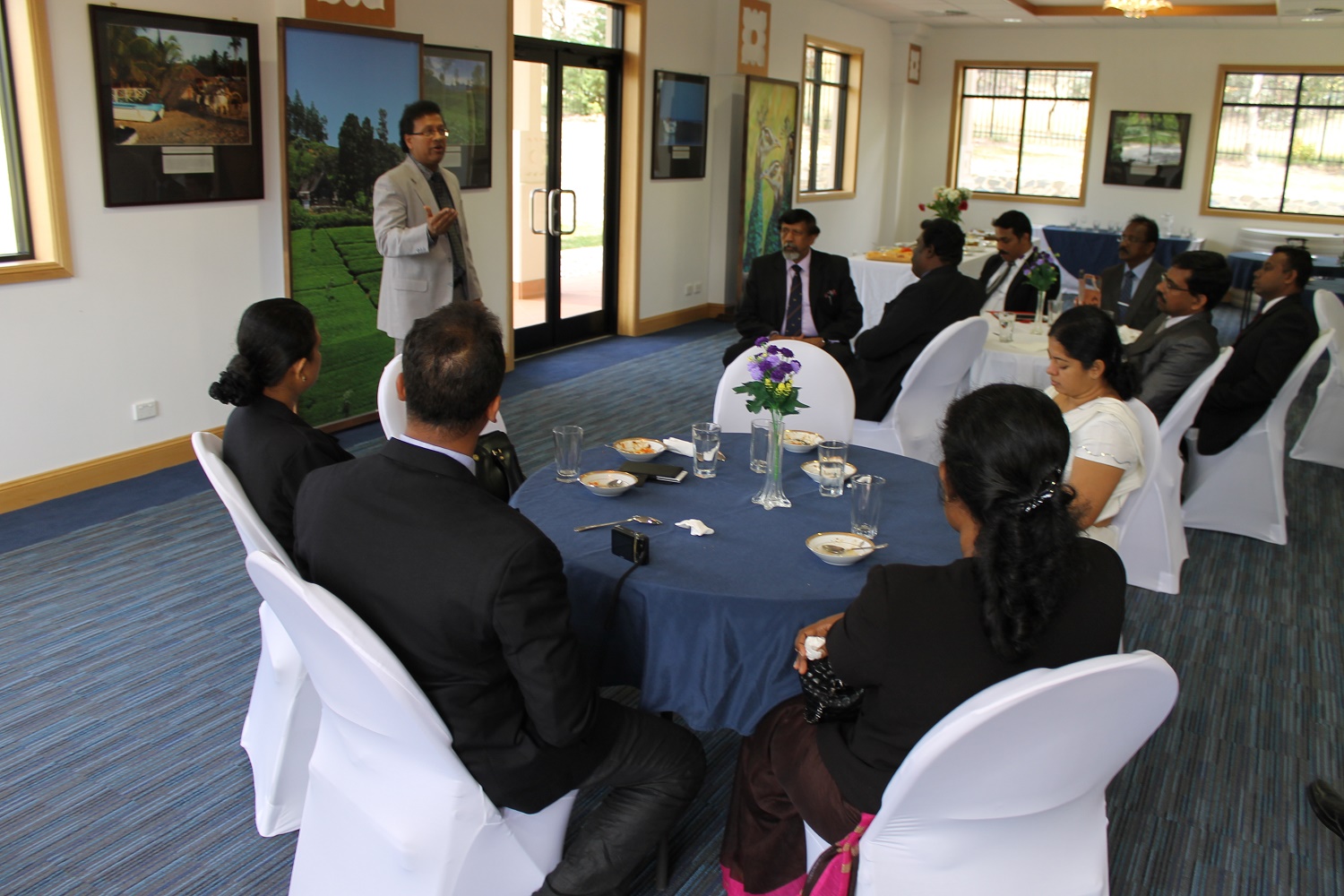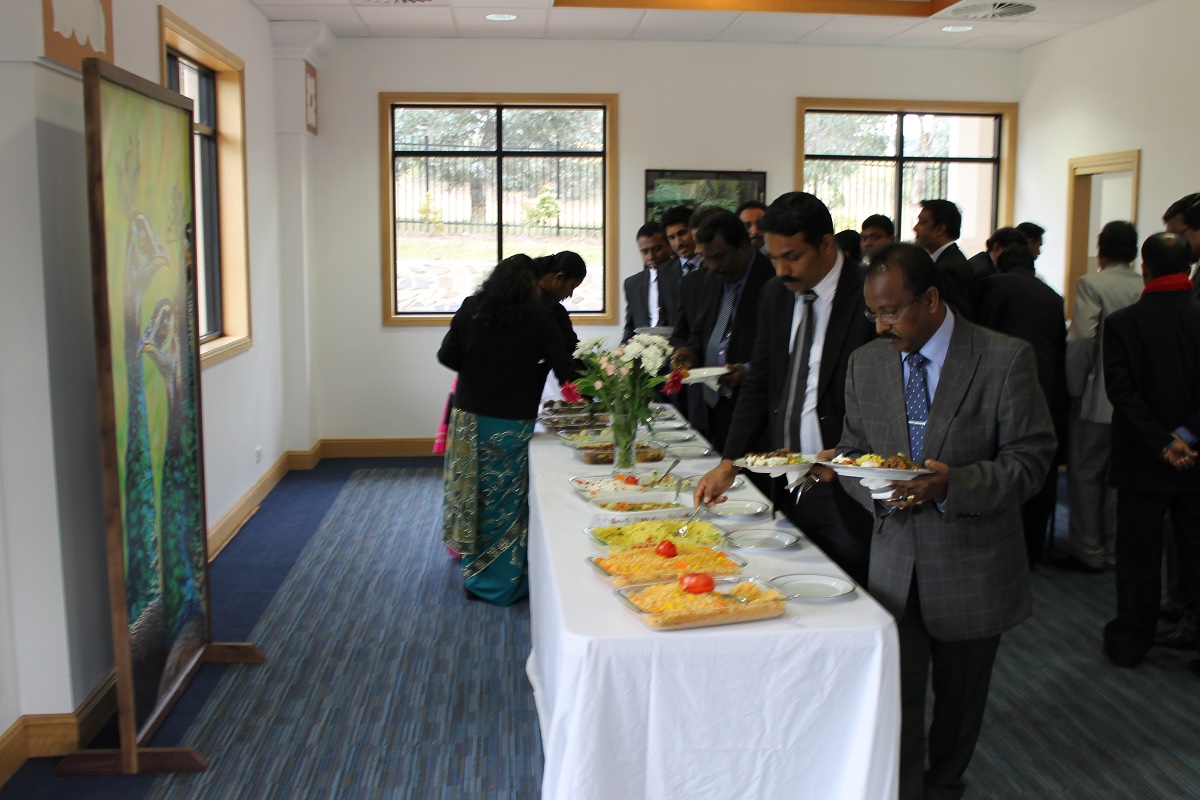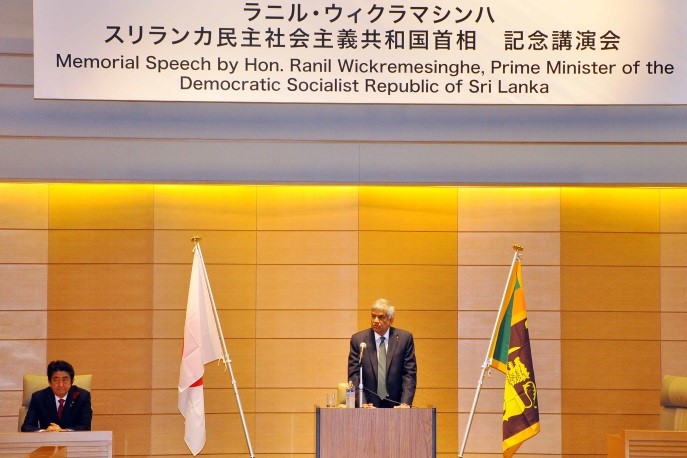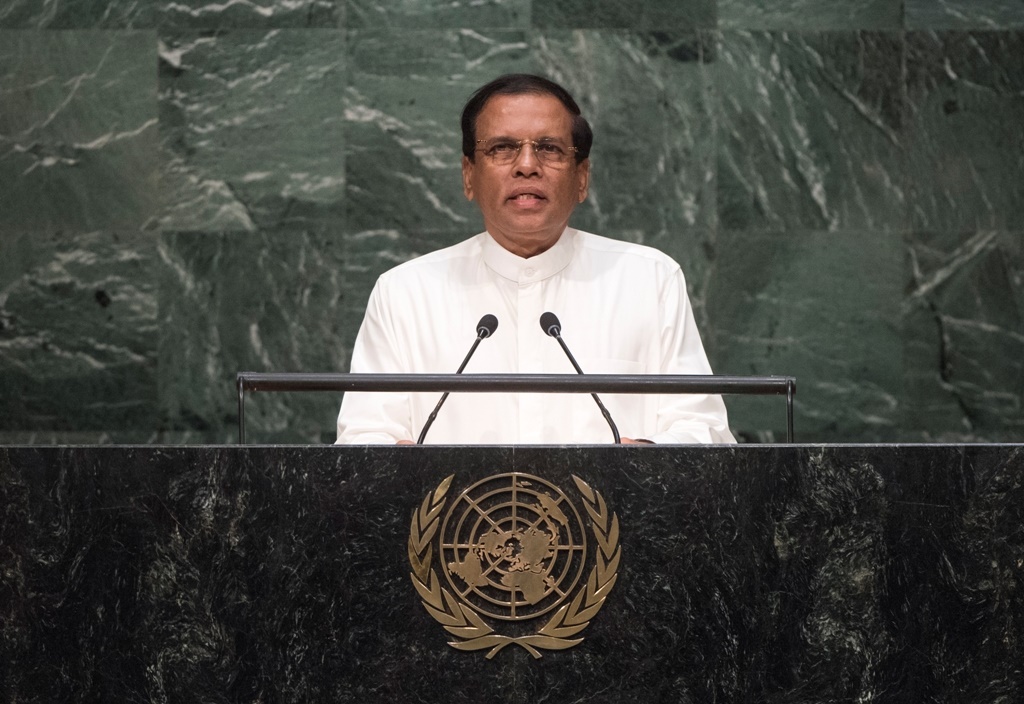


Foreign Minister Samaraweera signs agreement for creation of Commonwealth Trade Finance Fund for Small States
November 29, 2015
Foreign Minister MangalaSamaraweera together with the Foreign Ministers of India, Malta and Mauritius signed a Declaration of Intent for the creation of a Commonwealth Trade Finance Facility to assist boost trade and investment flows, particularly for small and developing countries in Malta on 26th November 2015.
The voluntary fund hopes to attract start-up capital of $20 million and will provide member countries facing trade challenges with the finance they need to increase their trade capacity. It is estimated for every dollar invested, the fund will generate $20.The Facility, structured as a guarantee fund, will cover risk for providers of trade credit in financial institutions of Commonwealth countries. It seeks to stimulate lending by major banks to smaller banks in member states and reduce risk.
Sri Lanka was one of the four countries that signed the declaration as anchor investors and has contributed to set up the facility.
Ministry of Foreign Affairs
Colombo
27 November 2015
Invest in East 2016: Second International Investor Forum for Eastern Sri Lanka
November 24, 2015
The Chief Ministry of the Eastern Province of Sri Lanka will be organising for the second time, a special Investment Promotion Forum for the Eastern Province on 28th of January 2016. The Forum will be a collaborative initiative with the Ministries and Agencies mandated with Investment Promotion and Economic Development of the Central Government.
The theme if the Forum is “Creating Conducive Environment for Investments and Employment Creation”, especially in the post conflict development context.
The Forum is expected to attract wide participation from both local and foreign stakeholders. A number of project proposals have been compiled in preparation of the Forum in areas covering agriculture, animal husbandry, fishing, tourism and small industries, and will be made available to potential investors attending the Forum. Sector specific investment promotion materials will also be available promoting the opportunities in the Province.
Speakers at the Forum will include Government officials, captains of Industry, tourism operators, corporate bodies, business associations and many other interest groups and individuals.
The Forum is aimed at improving the investment climate and to further encourage the inflow of domestic and foreign investment into the economy of the region.The formation and promotion of brand “Invest in East” to the world, particularly to the Sri Lankan diaspora is also a key objective.
For further details of the Forum and registration, please contact:
TRINCOMALEE OFFICE
Mr. Samantha Abeywickrama
Tel: +94-26 2-226-059
COLOMBO OFFICE
Ms. Thilakarani Fernando
Tel: +94-11-2-300-488
Fax. +94-11-2-303-318 Email: info@investineast.lk
Remarks to the Media by Foreign Minister following talks with US Permanent Representative to the UN
November 24, 2015
Good evening ladies and gentlemen.
It has been an honour and a privilege today to welcome Ambassador Samantha Power to this historic Republic building.
As all of you know, Ambassador Power is the second member of President Obama’s Cabinet to visit Sri Lanka in the space of a year.
This I believe indicates the level of excellence that relations between our two countries have now reached.
I met Ambassador Power in New York in February for the first time soon after being sworn in as Minister of Foreign Affairs of the Maithripala Sirisena administration. We have come a long way since then in laying the foundation for a strong Sri Lanka-US partnership.
Ambassador Power has been, and continues to be, a good friend of Sri Lanka. Even in the most difficult times, she always maintained faith and trust in the people of this country and in the latent strengths of our nation.
Her presence here with us is a source of encouragement to us as we proceed on the journey we began on the 8th of January to make our country a truly peaceful, reconciled, prosperous, nation which abides by the best democratic traditions; promoting and protecting the human rights of each of our citizens and celebrating the multi-ethnic, multi-cultural, multi-religious and multi-lingual nature of our society.
Today, Sri Lanka is taken note of by the world community, not merely in terms of geographic positioning but in terms of the changes that have been ushered in by the people of our country.
In our meeting, we discussed about working together to ensure that the people of our country benefit from these changes and from the peace and democratic dividend; ways of making our partnership stronger, including enhancing bilateral trade and investment.
It is a challenging path that we have chosen for ourselves as a nation. We have a long way to go and this is the first time that the people of Sri Lanka require the assistance of the international community to ensure that are gains are built upon; the dreams of our people are realized, and we define and create our future today by our hopes and aspirations without being held back anymore by the fears and prejudices of the past.
I am grateful to Ambassador Power for undertaking this visit. I look forward to staying engaged with her, and to work closely with her to further enhance US-Sri Lanka relations. I wish Ambassador Power and her team a very pleasant stay in Sri Lanka.
Thank you very much.
Deepavali Celebration
November 19, 2015
Deepavali Celebration organised by this High Commission will be celebrated on Sunday 22 November 2015 from 3.30 to 6.00 pm at the Sri Lanka High Commission premises.
Deputy Minister of Foreign Affairs visits Washington DC
November 4, 2015
Deputy Minister of Foreign Affairs Dr. Harsha De Silva, following his visit to attend the Open Government Partnership (OGP) Summit in Mexico, visited Washington DC on October 30, with a view to further promoting United States-Sri Lanka bilateral relations, in particular on economic and business matters. During his visit, he met senior officials of the US State Department, US Department of Treasury, US Department of Commerce, Office of Millennium Challenge Corporation (MCC) as well as the World Bank.
During his discussions with US officials, Dr. Harsha De Silva emphasized the importance of further promoting economic and business relations with the United States in the light of path breaking transformation taking place in Sri Lanka in terms of political reforms and addressing accountability issues. He discussed with US senior officials ways and means to achieve these objectives with the tools available and being designed by both countries.
Deputy Minister during his stay in Washington visited the newly opened Chancery building of the Embassy, becoming the first official visitor from Sri Lanka to visit the premises. Addressing the staff on this occasion, Dr. Harsha De Silva, alluding to the policies of the Government, emphasized the need to further promote both political and economic relations with the United States for the benefit of the people of both countries.
Embassy of Sri Lanka
Washington D.C.
3 November 2015
Michelle Rowland, MP (Australian Labor Party) meets High Commissioner
October 21, 2015
Ms. Michelle Rowland, MP (Labor – ALP) for Greenway, New South Wales called on High Commissioner, H.E. Somasunderam Skandakumar at the High Commission on 20th October. The constituency of Greenway comprise many Sri Lankans who have made their home in Australia. Ms. Rowland is a member of the Australia Sri Lanka Parliamentary Group and a lawyer by profession.
Department of Foreign Affairs and Trade of Australia (DFAT) funded programme for Senior Public Servants in Sri Lanka
October 15, 2015
Twenty five Senior Public servants in Sri Lanka participated Department of Foreign Affairs of Australia funded Professional Skills Development Progarmme in September 2015 which was a collaboration between the Department of Management of the Monash University and the Sri Lanka Institute of Development Administration (SLIDA).
During the five-week programme, the group also visited several places in the Australian capital including the Sri Lanka High Commission in Canberra. The Sri Lanka High Commissioner and the staff hosted them to lunch on 13 October 2015 at the Chancery.
Memorial Speech by Hon. Ranil Wickremesinghe – Prime Minister of Sri Lanka at the National Diet of Japan
October 8, 2015
Memorial Speech by Hon. Ranil Wickremesinghe – Prime Minister of Sri Lanka
at the National Diet of Japan
on 6th October 2015
Sri Lanka – Japan Relations : Future Direction
His Excellency the Speaker,
His Excellency the Prime Minister,
Distinguished Members of the Diet,
Ladies and Gentlemen.
It is with great pleasure and privilege and respect that I address this august audience. We have been in your country for three days and we leaving back to Sri Lanka tomorrow. My Delegation, including my wife and of course myself, were made to feel more than at home by your unique, sincere and warm hospitality and the courtesies integral and inherent to the peoples of Japan. We were extremely touched by the most cordial and congenial reception extended by the Government of Japan as well.
On this momentous occasion, I wish to take this opportunity to convey our good wishes and sincere appreciation on behalf of President Maithripala Sirisena, the Parliament and the peoples of Sri Lanka, to His Imperial Majesty the Emperor, the Prime Minister, the Government, the National Diet and the peoples of Japan.
The last speech made by the First Prime Minister of independent Sri Lanka, D S Senanayake was on the Japanese Peace Treaty. Speaking on 29th February 1952, he said,
“We can congratulate ourselves on being a party to this Peace Treaty. This is the first opportunity that Japan is getting to establish herself. We should not harbour anger and try to keep the Japanese people down.”
Twenty-two days later, he was dead. A month after his death, Sri Lanka fulfilled his policies by establishing diplomatic relations between the two countries. D S Senanayake was of the view that the post-war world should not be dominated by Western powers and the USSR. Therefore he did not waver in the belief that it was necessary to encourage Japan to re-start its economic development. His thinking was similar to that of Prime Minister Shigeru Yoshida and because of this conviction and foresight he waived war reparations from Japan to Sri Lanka.
As a part of this strategy, D S sent J R Jayewardene, the Minister of Finance to lead our delegation to the San Francisco Peace Conference. When I entered politics, I remember J R Jayewardene telling us of the conditions of the war ravaged Japan when he stayed at the Imperial Hotel on his way to San Francisco. On this occasion he also had the opportunity to meet with Prime Minister Yoshida. This is why he took a strong stand on the Peace Treaty when others in Asia were undecided or hesitant.
Commending J R Jayewardene in Parliament for this speech, D S Senanayake described him as “our representative with a backbone, who made it clear that we were not going to yield to the game played by the Soviet Union”. During this phase Japan-Sri Lanka relations were both emerging from World War II as we re-established our independence. Twenty-five years later, in 1977, J R Jayewardene himself became the Prime Minister of Sri Lanka and the following year he became the first Executive President of the country. By then Japan had become Asia’s economic miracle. During his tenure of office, relations between our countries became closer and stronger.
I was his first Deputy Minister of Foreign Affairs in 1977. One of the first foreign envoys sent to meet us was your Vice Minister representing the Prime Minister at the time, Mr. Fukuda. At that time, Mr. Jayewardene, being highly taken with the Fukuda Doctrine, sought the support of the Japanese Government to establish a market economy and to implement a massive development programme in Sri Lanka. Friendship between the two countries led to this much needed support. And we must remember with gratitude the gift of a hospital with 1001 beds by the Japanese Government to the new capital Sri Jayewardenapura.
One of the members of the Japanese Government who was involved at the initial stage in developing of economic relations between the two countries was the Minister of International Trade and Industries – Mr. Shinatro Abe, the father of the present Prime Minister. I must also mention the support given by the Prime Minister Nakasone and Foreign Minister Abe when Sri Lanka faced with communal unrest, terrorism and the ethnic conflict from 1983 onwards. I myself had the opportunity of coming here as the representative of President Premadasa to seek the assistance of your Government when we were the unfortunate, indirect victims of the invasion of Kuwait by Iraq and the resultant economic crisis. Prime Minister Kaifu was generous in his response.
When I became the Minister of Industries, Science and Technology, I sought the advice of Mr Saburo Okita. Then, when I became the Prime Minister in 2001, I was given the mandate by our people to engage in Peace Talks with the Tamil Tigers. And I must mention again, with appreciation, the help given by Prime Minister Koizumi in hosting the donor conference for Sri Lanka in Tokyo and for being a Co-Chairman of the Peace Process.
Today, the world order has seen far reaching transformations – politically, economically and technologically, especially since the time of President J R Jayewardene and Prime Minister Nakasone. Therefore it is imperative that these changes are reflected in the future direction of the relationship between our two countries – in particular, the new Japanese ODA Charter 2015. My visit to Japan is primarily to discuss the Declaration of the Comprehensive Partnership between our two countries. I believe this will be a framework for collaboration in the following spheres:
The political,
The economic,
The technological,
The cultural, and
Security.
The Comprehensive Partnership will delineate our cooperation in these important areas.
Sri Lanka elected a new President in January and a new Government in August of this year – I wish to take this opportunity to place this on record. Today, democratic norms including that of good governance, transparency, the rule of law and the rule of justice are being entrenched in the country. On 1st October 2015, the United Nations Human Rights Council’s Resolution on Promoting Reconciliation, Accountability and Human Rights in Sri Lanka commended the new Government for the initiatives already taken.
This Government consists of the United National Party and the Sri Lanka Freedom Party – the two largest political parties in Sri Lanka. Traditionally rivals, they entered into a Grand Coalition similar to what prevails in Germany … beginning a new era in political collaboration.
This has given us the mandate to restore peace, inclusivity, transparency and stability. As Abraham Lincoln stated “Ballots are the rightful and peaceful successors to bullets”.
Our political goals include a new Constitution, the consolidation of human rights and the strengthening of democratic institutions.
But what is most important to us is to incorporate a political settlement to the outstanding issues relating to national unity, ethnicity and religion.
We have already started informal discussions with the Tamil National Alliance and other parties on a political solution. The language and ethnicity issues, which dominated the country over five decades, and religious discord that were stirred up during the last decade, must be resolved if a strong Sri Lankan identity – based on equality – is to be established. Only this will bring about an inclusive settlement acceptable to all communities.
We also look forward to Japan contributing to National Reconciliation and Peace Building in Sri Lanka. Once again we are seeking Japanese assistance to summon a meeting of donors to assist in the reconstruction and in revitalizing the socio economy of the conflict-affected areas.
With women being a majority in our population, the Women’s Rights law will incorporate the UN principles on the Elimination of all forms of Discrimination against Women. Currently, all elected women representatives in the country are less than 5% of the total number of political representatives. Therefore another law will provide reservations for 25% women representatives in Municipalities and Provincial Councils. The Parliament will give affect to recommendations of the Task Force on Sexual and Gender based Violence. We are also in the process of establishing a national centre for women headed households – with its headquarters in the North of the country.
The Government gives priority to protecting the environment since we are all in agreement to safeguard the rich bio-diversity in Sri Lanka. Tackling climate change will receive priority under this policy. The Parliament will also establish, by law, a Sustainable Development Council to enact the Sustainable Development Goals.
The 19th Amendment to the Constitution limited the powers of the Executive Presidency. We are now discussing measures to strengthen Parliament. This will include the introduction of oversight committees, similar to the National Diet, the US Congress and the EU Parliament. There will also be a Parliamentary Budget Office. The Mandate of the J R Jayewardene Centre will be expanded to include research and training for Parliamentarians thereby forming a back up office to Parliament and core political training on the enactment of legislation, parliamentary conventions and procedures, ethics and good practice for new legislators.
The Tamil National Alliance, now the third largest party holds the leadership of the Opposition, while the JVP the Peoples Liberation Front has the office of Chief Opposition Whip. Therefore the main parties hold Office in either the Government or in Parliament, resulting in the Parliament becoming the national forum. We will also televise Parliamentary proceedings. We will, thereby, attempt to build on Lord Buddha’s advice to the Lichchavi Republican Assemblies in the Ganges, “to meet in harmony, to discuss in harmony and depart in harmony”.
Let me now say a few words on the recent developments in regard to a national machinery for reconciliation and accountability. In this, we will be guided by the same words of Lord Buddha that J R Jayewardene quoted in San Francisco. “Hatred ceases only by love”. Therefore, we are discussing with South Africa, the architecture of a new structure for a truth machinery. This will include, first, a Truth Commission to record the instances of violence and violations. Second, we will establish an innovative new mechanism – a Compassionate Council – headed by the leading clergy of all the religions – Buddhist, Christian, Hindu and Muslim. They will give us advise on the measures to be taken on individual cases. Finally, we will be devising a new judicial structure to inquire into the violation of human rights.
The Government is planning to carry out the next generation of economic reforms to make Sri Lanka a highly competitive economy – we are aiming to be the most competitive in South Asia – on par with South East Asia. The Ministry of Development Strategy and International Trade will coordinate all investments and economic relations. The barriers to Direct Foreign Investments including the bottleneck and delays to doing business will be removed. There will also be reforms in the Financial and Monetary sectors and a more stringent control of the Budgets. We have created a new Ministry for Telecommunication and Digital Infrastructure.
Sri Lanka will also strengthen its social sector programme especially Universal access to Education and Health by increasing the budgetary allocations to both these sectors. Finally, a new set of laws will be put in place to combat corruption and financial crimes.
Since time immemorial Sri Lanka has been at the heart of Indian Ocean trade, and more precisely in the Bay of Bengal. We will continue this tradition by entering into an Indo-Lanka Economic and Technology Collaboration partnership, Free Trade Agreements with Pakistan, Bangladesh and the ASEAN nations bordering the Bay of Bengal – Myanmar Thailand, Malaysia, Singapore and Indonesia.
We are preparing ourselves for an Asia Pacific based on the Trans Pacific Partnership. Sri Lanka will also negotiate with the EU for GSP+ concessions and with China for a
Free Trade Agreement.
Today the global economy is still recovering from the 2008 financial crisis. I believe that two major economic developments will determine the fate of medium term global growth.
First – the normalization of the US monetary policy.
The second is China’s slow transformation to an economy relying on consumption, which will lead to slower and sustainable growth in China.
In this background, the Managing Director of IMF, Christine Lagarde has described the medium term growth prospects as “the new mediocre”.
I am advocating that we, in South Asia, respond to this predicted low growth scenario – by creating a High Growth South Asia Region.
The economies of UK and US are performing well while the EU and Japan are on the way to full recovery. India is expected to sustain its growth.
The new national Government in Sri Lanka is providing stability for economic restructuring which is expected to lead to a high rate of growth. However Japanese participation in South Asian Economic Development will add momentum to enable higher growth rates in South Asia. This requires multiple options to be pursued – including Japanese Connectivity to India through Sri Lanka.
Speaking at the STS Forum in Kyoto, I proposed a partnership between Japan and the South Asian countries to enable the application of Japanese Science and Technology to transform the regional economy. I am convinced that we have to make this happen – not only will it profit South Asia but it will benefit Japan too, giving her a lead role in shaping the South Asian economy.
Today South Asia has a population of 1.6 billion people and a GDP of US$ US$ 2.6 trillion. By 2050 the region’s population is projected to increase to about 2 billion, which will make it larger than East Asia. Let us ponder on that.
Let me reiterate, we will look to Japan to take the lead in the economic transformation of Sri Lanka and South East Asia. To create a South Asian High Growth Area enabling the region to fulfill its economic potential and bring higher living standards to its people. This will also have a positive impact on the medium term Global Economic growth. It is in this context that we are discussing a new collaboration partnership with Japan. Sri Lanka is willing to make the start on this new journey, which will also offer many new opportunities for Japanese investors.
The proposed collaboration, as I stated before, also aims to utilize Japanese science and technology, to overcome the economic challenges to development. This requires multiple approaches to utilize Japan’s experience, namely,
1. Collaboration between existing institutions
2. Building Centres of Excellence in Science and Technology Innovation
3. Strengthening of Science and Technology education and the establishment of an Institute of Technology with a Japanese ethos.
4. Assistance to strengthen human security and to counter climate change.
Finally, I would like to invite Direct Japanese Private Investments in all sectors and we will put in place the appropriate environment for this. We also hope to improve bilateral trading and enhance inter-personal relations by attracting Japanese tourists.
The proposed collaborations will be parallel to the existing infrastructure development programmes and the financial assistance programmes aiming to create synergies and a strategic platform for Japan’s activities in Sri Lanka and the South Asian region.
I further propose that this economic collaboration be buttressed by political collaboration, which will further strengthen the ties between our two countries.
I believe that we have a common interest in Maritime Security and Oceanic issues especially in regard to the Indian Ocean:
The reduction of tension in Asia,
The maintenance of free, open and stable seas – based on the Rule of Law,
Improved maritime connectivity, and
Reforms to the UN Security Council.
In conclusion, I wish to take this opportunity to record the gratitude and appreciation of the Government, the peoples of Sri Lanka and of myself to the Government and the peoples of Japan – for the cooperation and assistance extended to Sri Lanka, in a myriad of ways, over the past decades.
Further, being afforded the opportunity to address the members of the National Diet of Japan is deeply valued and appreciated by my delegation and by myself. I will be failing in my duty if I do not mention the role played by Mr Koji Omi who ensured that this visit was a success.
May I also add that over the last several decades the Government and the peoples of Japan have been exceptionally and remarkably generous in extending assistance and cooperation towards the advancement of the developing and less developed nations in the world (including Sri Lanka). By being so benevolent, the happiness, comfort and the well-being of the peoples of Japan will surely never decrease.
And I wish to quote, the judicious words of Lord Buddha:
“Thousands of candles can be lit from a single candle, and the life of the candle will not be shortened.
Happiness never decreases by being shared.”
I thank you.
Address by H.E. President Maithripala Sirisena at the 70th Session of the United Nations General Assembly New York, 30th September 2015
October 1, 2015
Mr. President,
Mr. Secretary General,
Excellencies,
Delegates,
Ladies and Gentleman
Being a long standing member of the United Nations, it is indeed an honour and a pleasure for me to address the United Nations Annual General Assembly as the newly elected President of the Democratic Socialist Republic of Sri Lanka.
Your Excellency Mogens Lykketoft, on behalf of the Government and people of Sri Lanka, please accept my heartfelt congratulations on your election as the President of the 70th Session of the General Assembly.
Let me also convey my gratitude to the former President His Excellency Sam Kutesa who contributed immensely to the achievements of the 69th Session of the General Assembly.
The United Nations now has a distinguished track record of seventy years. We in the UN have consistently engaged in the responsible and challenging task of ensuring global peace, security and development during these past seventy years. However, I realize that similar challenges are still ahead of us.
Mr. Trygve Lie, the first Secretary-General of the United Nations when leaving office at the height of the Korean crisis in 1953 described the Secretary-General’s position as: “The most impossible job in the world”. It is no secret that all Secretaries-General who have held office contributed substantively to promote the universality of the United Nations and make it an organization that could serve humanity well in to the future.
The incumbent Secretary-General His Excellency Ban Ki-moon has also made an excellent contribution to the Organization. Secretary General Ban Ki-moon, please accept my honoured gratitude and that of my people for the service you have rendered.
Mr. President,
Sri Lanka has been a member of the United Nations for sixty years. As a member state we have played a very active and responsible role in the Organization.
Sri Lanka is a nation that respects the purposes and principles of the Charter of the United Nations and international conventions and treaties. A main objective of the UN is to recognize, safeguard and promote human rights. Sri Lanka remains committed to fulfil this responsibility. In this respect, we intend implementing a new programme and plan of action in Sri Lanka to advance human rights.
Sri Lanka plays a multi-faceted role in the United Nations. Our contribution to UN peacekeeping missions that began in the 1960s continues. Sri Lanka looks forward to enhancing further, our committed contribution to UN Peace Keeping in the future.
Mr. President,
A new era of democracy dawned in Sri Lanka on January 08th 2015 ushering justice, freedom and equality. Our social and human development approach is founded on pluralism, reconciliation and sustainable development. The development vision of my Government for the next five years is also based on the same.
The theme of this Session – “Seventy Years of the UN: the Way Forward to Peace, Security and Human Rights”, is therefore very much in consonance with the vision of my Government. Moreover, my Government is committed to developing a proactive and practical programme in Sri Lanka to further ensure peace, security and human rights.
Mr. President,
The people of Sri Lanka elected a new President and a new Government in two consecutive elections during the last eight months. Within the first six months, my Government introduced essential amendments to the Constitution in order to strengthen democracy in Sri Lanka. These amendments have reinforced the foundations of good governance through institutional reforms that strengthened pluralism and democracy. With my personal intervention and facilitation, some of the executive powers vested in the Presidency were transferred to the Parliament and other independent institutions.
Following the General Elections in August this year, I was able to unite the two major political parties in the country to create an alliance for consensual governance in the country, changing the confrontational political culture that prevailed in the country for six decades.
Our new vision for the country involves achieving the twin objectives of sustainable development and reconciliation. A fundamental requirement in this context is dealing with the past honestly and building a modern Sri Lankan Nation.
In dealing with the past we will follow a process of truth seeking, justice, reparation and non-recurrence.
It is imperative that Sri Lanka adopts a new social, economic and political approach to rise up to the challenges of the 21st century. In this regard, reconciliation receives priority attention in my country. The new consensual government under my leadership has already taken several steps to introduce and operationalize constitutional and institutional reforms required to accelerate achievement of these goals.
Mr. President,
Sri Lanka is a country that has suffered from conflict. While conflict brings destruction to a society, there are also many lessons that could be learnt during and after conflict.
All forms of war and terrorism are a disgrace to humanity. The Preamble of the Universal Declaration of Human Rights states the manner in which such rebellions break out. Whatever their root cause is, the challenge of this era is to find ways and means to defeat such brutality against humanity. Resorting to terrorism as a means to solve grievances as well as action taken to eliminate such terrorism can create problems. Sri Lanka succeeded in eliminating terrorism, which continues to throttle other developing countries extending from Asia to Africa and Latin America.
We defeated one of the world’s most ruthless terror outfits. Equally, our post conflict experiences also have been significant. We believe that all these experiences can be shared fruitfully with other developing countries affected by terrorism. Sri Lanka remains prepared to engage in a more active dialogue with these countries and continue to speak and advocate against terrorism.
Mr. President
It is in this context that I wish to address the theme of this year’s Sessions.
We all know that the United Nations was established with the objective of preventing the recurrence of human tragedies derogatory to mankind that took place in the twentieth century. The theme this year is: “Peace, Security and Human Rights”. This theme motivates us to review whether we have lived up to the initial expectations of the United Nations during the past seven decades.
Mr. President,
I believe that for global development, it is important to have a dialogue within the South as much as between the North and South. My country that represents the South can contribute immensely to nurture such South-South dialogue.
Mr. President,
Sri Lanka is in the forefront among the oldest representative democracies in the South Asian region. We have been fortunate in preserving the democratic ethos in our country despite the prolonged conflict. Despite several factors militating against maintaining a high economic growth rate, we succeeded in sustaining the state social welfare policies that were carried over from Independence. We never compromised on these policies which includes universal free education, free healthcare and eradication of poverty. Following a path of social democracy, Sri Lanka has succeeded in achieving high levels in the Human Development Index, even during the years of conflict. This success is testimony to our commitment for achieving the Millennium Development Goals of the United Nations.
Mr. President,
Development should result in empowerment of women and youth and assure security for children. Frustration in youth usually leads to conflict. Nevertheless, Youth is the driving force for sustainable development. Therefore, we should transform the youth to a totally skilled workforce to succeed in the 21st century knowledge-based world. It should be a lead component of the Post 2015 Sustainable Development Agenda.
We should similarly launch a national programmes to empower women and thereby enhance their contribution in development. Special programmes to protect the children and safeguard their rights are also an essential factor to develop an efficient and humane society.
My understanding of sustainable development is not to have sectorally or group-wise isolated development, but to have an inclusive model of development that is capable of uplifting development standards globally. For this purpose, I stress on the need for a fresh universal approach.
Mr. President,
As we learn from the Buddhist tradition prevalent in Sri Lanka, I recognize there are three kinds of human conflicts.
The first is the conflict between the human being and nature. We are constantly engaged in this conflict in order to enjoy material comforts in life. As a result, modern human beings seek to exploit natural resources extensively in the name of development.
The second is the conflict between ‘human’ and ‘human’. Such conflicts occur among individuals, among communities and among nations. The Universal Declaration of Human Rights affirms that such conflicts occur when human rights are not protected by rule of law.
The third is the conflict within the human being. The two kinds of conflict I mentioned earlier occur when we lose the battle within us as human beings. Therefore, this is the root cause of all conflicts.
Mr. President
Extremism, over-consumption, arbitrary exploitation of the environment, violation of human rights, vicious disparities in income are all results of our inability to overcome our craving. Among other problems, they cause insecurity, conflict, rights violations, and exploitation.
The edifice of sustainable development should therefore be built upon the foundation of self-discipline and equity. If this could be practised at a personal, community, national and global level, it would mark a giant leap forward for human kind.
I propose that we as national leaders, take cognizance of this self-discipline and equity-based approach when drawing relevant Action Plans for the future.
May the Noble Triple Gem Bless you.
TOURISM SUMMIT 2015
September 10, 2015
First summit to be held at the Cinnamon Lakeside Colombo on 28th September (World Tourism Day) based on the theme ‘Future of Tourism and Responsible Tourism for Driving Revenue’,
With the fast and increasing speed of technological development and the increasing globalization, Travel & Tourism has been a point of focus globally.
Following the Post-Millennial era, the Tourism Industry is experiencing rapid growth as well as dynamic change as with all other Industries. However, research suggests that Travel &
Tourism will be one of the most dominant industries by 2025 and beyond as mobility becomes easier and cheaper and interest to travel increases.
Together with this boom and other infrastructure development it is important that the relevant stakeholders in the Tourism Industry are well aware of future travel trends as well as responsible practices to be adopted in order to optimize the opportunity we have in this changing landscape of tourism.
The Cinnamon Future of Tourism Summit will be held on the 28th of September 2015 at Cinnamon Lakeside Colombo and will be attended by approximately 250 travel industry leaders in
Sri Lanka and from the Region along with Global experts on Tourism and Responsible Travel as Speakers.
The keynote speech on “How Sustainable is our Future” will be delivered by Prof. Mohan Munasinghe, Vice Chair of the Nobel Prize winning UN Intergovernmental Panel on Climate Change (2007).
Other speakers include of Dr. Roland Conrady, Scientific Director of ITB Berlin, the world’s leading travel trade fair, Prof. Sarath Kotagama speaking on “”Responsible product innovation”, Dr. Ian Yeoman speaking on “Tomorrow’s Tourist”, Robert Govers speaking on “Destination Branding”, April Rinne speaking on “Shared Economy principle”, Renne Massatti representing Trend One who will be giving an innovative presentation on “The World in 2025” and Shabori Das from Euromonitor analyzing some of the key travel trends for the future.
Online tickets can be bought via bit.ly/fottickets
Contact the Hotline on +94 712 070 972 or mail to: info@futureoftourism.co
Read more: http://www.futureoftourism.co/
Register with the High Commission
The Sri Lankan High Commission in Canberra would like to keep in touch with Sri Lankans and persons of Sri Lankan origin living in Australia, New Zealand, Fiji, Papua New Guinea, Vanuatu and other Pacific Islands as well as Sri Lankan community organisations in those countries.
If you are a current/former Sri Lankan or an office bearer of a Sri Lankan community organisation we invite you to register with the High Commission.
RegisterAddress
Sri Lanka High Commission
61, Hampton Circuit
Yarralumla
ACT 2600

